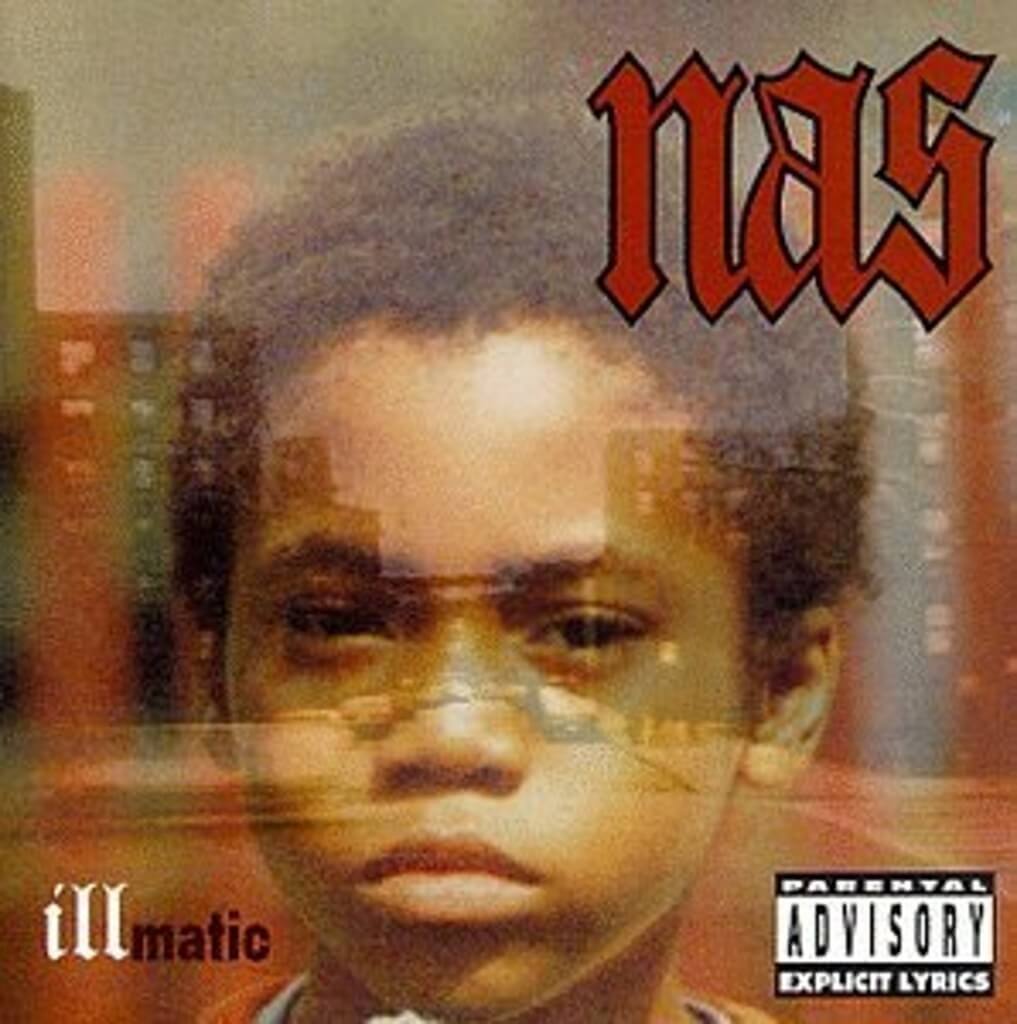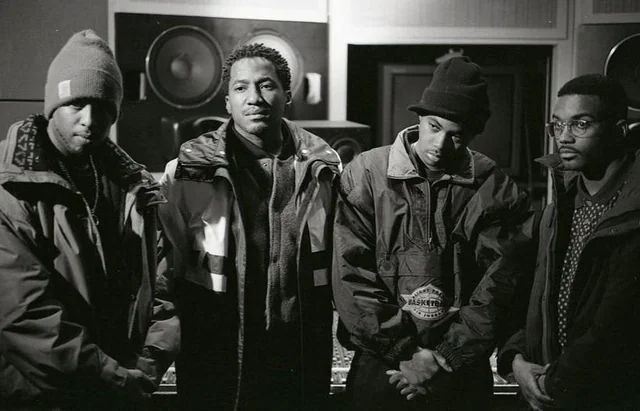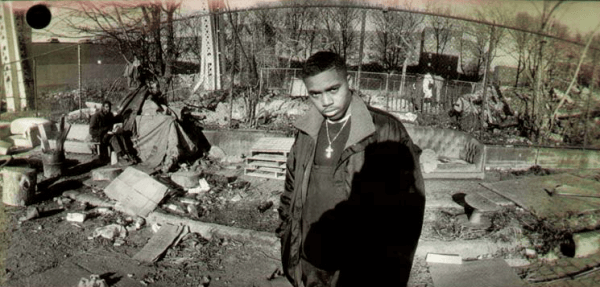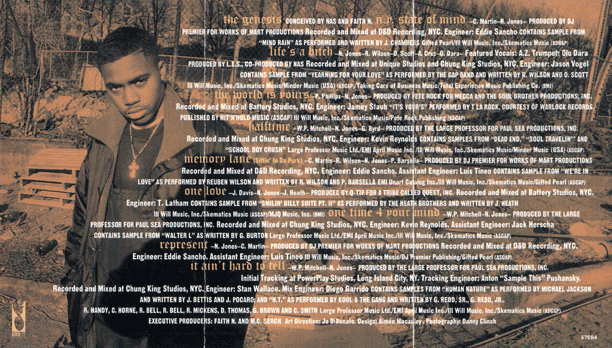
Nas’ Illmatic, released in 1994, is widely regarded as one of the greatest Hip Hop albums of all time, a statement that’s been repeated so often it almost seems redundant to say. But what makes Illmatic so remarkable is not only its technical excellence but also its lasting impact on the genre and culture of Hip Hop. In just 10 tracks (an intro and 9 actual songs) and 39 minutes, Nas, only 20 years old at the time, crafted an album that distills the essence of New York street life into a poetic and cinematic narrative. It became a blueprint for East Coast rap, demonstrating the power of intricate lyricism paired with meticulous production.
Nas’ lyrical prowess, the complexity of his rhymes, his vivid storytelling, and his ability to weave social commentary into personal reflections make each track feel like a slice of life captured in poetry. The album’s intro, “The Genesis,” serves as an atmospheric opener, blending subway sounds and bits of conversation that set the stage for what’s to come. While it doesn’t feature actual verses, the track serves as a backdrop for the listener to immerse themselves in the sound of New York City. It hints at the life Nas is about to reveal—a life shaped by the streets, filled with both beauty and darkness.
The album’s first proper song, “N.Y. State of Mind,” is one of the most iconic tracks in Hip Hop history. Over a haunting beat produced by DJ Premier, Nas delivers a relentless barrage of vivid, cinematic rhymes. He opens with the now-legendary line, “Straight out the dungeons of rap / Where fake n***** don’t make it back,” immediately pulling the listener into the gritty world of Queensbridge. The song plays out like a tour of Nas’ neighborhood, where survival is paramount, and every day is a struggle. Lines like, “I never sleep, ‘cause sleep is the cousin of death,” encapsulate the paranoia and hyper-awareness required to navigate that environment.
Nas’ storytelling ability is on full display throughout Illmatic, but “N.Y. State of Mind” remains one of his finest moments. It feels less like a rap song and more like a short film, with Nas as the director. His intricate rhyme schemes, vivid imagery, and use of internal rhyme create a dense lyrical landscape that rewards repeated listens. The song serves as both a celebration and a critique of New York City, capturing the harsh realities of life in the projects while also highlighting the resilience and creativity that can arise from such an environment.
Each track on Illmatic reads like a chapter from a memoir, filled with striking details that make the broader themes of poverty, violence, and survival hit with even more intensity. Whether he’s discussing the death of friends on “Memory Lane (Sittin’ in da Park)” or the daily grind of hustling on “The World Is Yours,” Nas strikes a balance between the personal and the universal. His lyrics are densely packed but never convoluted, allowing the listener to appreciate his verbal dexterity while still feeling the weight of his messages.
On “Life’s a B****,” Nas teams up with AZ, delivering one of the album’s most introspective and reflective songs. Over a somber instrumental produced by L.E.S., the two rappers explore the fragility of life and the inevitability of death. AZ’s opening verse is a lyrical masterpiece, filled with tightly constructed rhymes that contemplate the fleeting nature of happiness. Nas follows with his own reflection on mortality, expressing a deep sense of urgency as he raps, “I woke up early on my born day, I’m 20, it’s a blessing / The essence of adolescence leaves my body, now I’m fresh in.” The song’s closing trumpet solo, performed by Nas’ father, jazz musician Olu Dara, adds a final layer of melancholy to the track, making it one of the most poignant moments on the album.
Equally important to Illmatic’s success is its production, which brought together some of the most talented beatmakers of the era: DJ Premier, Pete Rock, Large Professor, Q-Tip, and L.E.S. Each producer brought their own flavor to the album, yet it feels remarkably cohesive. The beats provide a perfect canvas for Nas’ intricate lyrics, enhancing his flow and adding texture to his storytelling.
DJ Premier’s contributions to the album, especially on tracks like “N.Y. State of Mind” and “Memory Lane,” are highlights. Premier’s signature chopped-up jazz samples and boom-bap drums create a soundscape that feels timeless and distinctly New York. The sample-heavy beats reflect the golden age of Hip Hop while Nas’ lyrics push the genre forward. On “Memory Lane,” Premier constructs a minimalist beat around a haunting vocal sample, allowing Nas’ reflective verses to shine through. The simplicity of the production contrasts with the complexity of Nas’ storytelling, creating a track that feels intimate and expansive.
Pete Rock’s production on “The World Is Yours” stands out for its laid-back, soulful feel. Sampling Ahmad Jamal’s “I Love Music,” Rock crafts a beat that contrasts the grim realities Nas raps about with a hopeful undercurrent, underscoring Nas’ message that success is possible even in the face of adversity. The track’s hook, sung by Pete Rock himself, has become one of the most memorable in Hip Hop: “Whose world is this? The world is yours.” This refrain serves as both an affirmation and a question, reflecting the duality of Nas’ mindset throughout the album.
Large Professor, who was an early mentor to Nas, produced “Halftime” and contributed to the album’s overall direction. His beats are raw and minimalist, but they perfectly suit Nas’ storytelling style. The starkness of “Halftime” emphasizes Nas’ raw talent, allowing his lyrics to take center stage. The song, originally released in 1992 on the Zebrahead soundtrack, served as Nas’ official debut single and played a significant role in building the buzz around Illmatic before its release, together with a young Nas’ epic appearance on the classic Main Source posse cut “Live At The BBQ” also in 1992.
Q-Tip’s contribution on “One Love” adds yet another dimension to the album. The track, written as a series of letters to Nas’ friends in prison, is more introspective and personal than many of the other songs. Q-Tip’s mellow, hypnotic production and the African percussion sample create a reflective backdrop that enhances Nas’ bittersweet verses. The song captures the emotional complexity of maintaining relationships with loved ones behind bars, and Nas’ heartfelt delivery makes it one of the album’s standout tracks.
Despite the varied production styles, the album never feels disjointed. Instead, the different sounds blend together to create a cohesive musical landscape. The producers managed to create a sound deeply rooted in New York’s past while pushing the genre toward new creative heights.
One of the most striking features of Illmatic is its ability to capture the essence of New York City in the 1990s. Every song feels like it’s rooted in the streets of Queensbridge, the housing project Nas grew up in, but the album’s themes—poverty, violence, friendship, betrayal—are universal. Nas paints a picture of a city that is both beautiful and brutal, where dreams and nightmares exist side by side. The way he describes the daily struggles of life in the projects feels lived-in, and his attention to detail brings each verse to life.
On “One Time 4 Your Mind,” Nas reflects on the mental toll of living in a place where violence is always lurking. Yet, despite the grimness of his subject matter, there’s a sense of pride in his voice when he talks about Queensbridge. He’s not just telling the listener about life in New York—he’s inviting them into his world, showing both the darkness and the glimmers of hope that come from growing up in a place like that.
The album is not all darkness, though. Tracks like “The World Is Yours” and “Life’s a B****” show that despite the harshness of his surroundings, Nas still harbors ambitions for a better life. The album is filled with moments of reflection, where Nas seems to step back and ponder the bigger picture. These tracks add a level of emotional complexity to Illmatic that elevates it beyond typical street narratives of the time.
The closing track, “It Ain’t Hard to Tell,” produced by Large Professor, brings the album full circle. Over a beat that samples Michael Jackson’s “Human Nature,” Nas delivers a confident, boastful verse that reflects on his newfound status as one of the best rappers in the game. The song’s infectious energy and Nas’ sharp lyricism provide a fitting end to an album that has taken the listener on a journey through the highs and lows of life in New York City.
The influence of Illmatic on Hip Hop is difficult to ignore. In an era dominated by West Coast G-funk, Nas’ brand of raw, introspective lyricism helped revitalize East Coast rap. His debut set a new standard for lyricism, with its dense wordplay, intricate rhyme schemes, and vivid storytelling. Nas inspired a generation of rappers to be more thoughtful with their lyrics, encouraging them to dig deeper into their personal experiences and present their stories with the same level of detail and honesty.
Illmatic didn’t achieve massive commercial success upon its release, peaking at No. 12 on the Billboard 200 chart, but its critical acclaim was immediate. Over time, the album’s reputation grew, and it’s now recognized as a classic that transcends its era. It has been referenced, dissected, and analyzed countless times, and many of today’s biggest rappers—Kendrick Lamar, J. Cole, and Joey Bada$$ among them—cite Illmatic as a direct influence.
Beyond its influence on Hip Hop, Illmatic has become a cultural touchstone. It’s a time capsule of New York in the 1990s, a snapshot of the hopes, struggles, and dreams of an entire generation of young Black men coming of age in a city filled with both opportunity and danger.
The album’s influence extends beyond the borders of New York City. It helped elevate the status of Hip Hop as a legitimate form of artistic expression, showing that rap could be both socially conscious and commercially viable. Nas’ lyrical prowess and the album’s cohesive production set a high bar for future releases, challenging other artists to elevate their craft and take Hip Hop more seriously as an art form.
Illmatic also had a profound impact on Nas’ career. While he struggled to replicate the critical success of his debut with later releases, Illmatic cemented his status as one of the greatest rappers of all time. The album’s influence can still be felt in Nas’ later work, as well as in the broader landscape of Hip Hop. It has been sampled, referenced, and paid homage to in countless ways, further solidifying its place in the canon of Hip Hop classics.
Illmatic is the perfect balance of lyricism, production, and storytelling. It’s an album that feels timeless, yet deeply rooted in its time and place. Nas’ skill as a lyricist, combined with the stellar production from some of the best beatmakers of the era, makes Illmatic a masterpiece that continues to inspire generations of Hip Hop artists. It’s an album that represents the pinnacle of what rap can be: a medium for artistic expression, social commentary, and personal reflection.
Even decades after its release, Illmatic holds its place as one of the greatest Hip Hop albums ever made. Its impact on the genre is undeniable, and its influence can still be heard in the work of contemporary artists. Nas’ debut remains a powerful reminder of the transformative potential of Hip Hop and the enduring legacy of New York City’s vibrant, dynamic rap scene.






